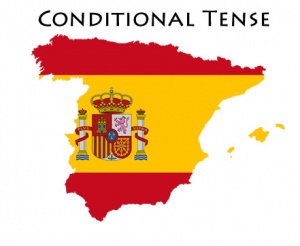Difference between revisions of "Language/Spanish/Grammar/Conditional-Mood"
| Line 1: | Line 1: | ||
[[File:spanish-Conditional-Tense.jpg|thumb|none]] | [[File:spanish-Conditional-Tense.jpg|thumb|none]] | ||
==Zero Conditional== | |||
{| class="wikitable" | {| class="wikitable" | ||
| Line 14: | Line 14: | ||
Ex. ''If/When you press the button, the machine starts.'' | Ex. ''If/When you press the button, the machine starts.'' | ||
==Conditional Sentences Type 1== | |||
We use Conditional Sentences Type 1 for something which is likely to happen in the present or future. | We use Conditional Sentences Type 1 for something which is likely to happen in the present or future. | ||
| Line 37: | Line 37: | ||
''If you go to the supermarket, buy some milk.'' | ''If you go to the supermarket, buy some milk.'' | ||
==Conditional Sentences Type 2== | |||
We use Conditional Sentences Type 2 for unreal or imaginary situations which are unlikely to happen in the present or the future. | We use Conditional Sentences Type 2 for unreal or imaginary situations which are unlikely to happen in the present or the future. | ||
| Line 73: | Line 73: | ||
|} | |} | ||
==Conditional Sencentes Type 3== | |||
{| class="wikitable" | {| class="wikitable" | ||
!if-clause | !if-clause | ||
Revision as of 19:04, 10 February 2019
Zero Conditional
| if-clause | Main clause |
|---|---|
| If/When + Present Simple | Present Simple |
The Zero Conditional is used to talk about general truths.
Ex. If/When you press the button, the machine starts.
Conditional Sentences Type 1
We use Conditional Sentences Type 1 for something which is likely to happen in the present or future.
| if-clause | Main clause |
|---|---|
| If + Present Simple | -Future will |
| -Modal Verbs (can, amy, might,
must, should) + base form | |
| -Imperative |
If I see James, I will give him his book back.
If you want a pet, you must promise to take care of it.
If you go to the supermarket, buy some milk.
Conditional Sentences Type 2
We use Conditional Sentences Type 2 for unreal or imaginary situations which are unlikely to happen in the present or the future.
| if-clause | Main clause |
|---|---|
| If + Past Simple | Would/could/might + base form |
If I won the lottery, I would buy a farm in the country.
You could lose some weight if you went on a diet.
I might move to London if I got a good job there.
| -In Conditional Sentences Type 2 were is often used
instead of was in the if-clause. If I were rich, I would live in a luxurious house. -We use If I were you to express an opinion or to give advice. If I were you, I wouldn't buy it. -Unless can be used instead of If...not... in all conditional sentences. I won't buy this car unless you agree (= if you don't agree) -When the if-clause comes before the main clause, the two clauses are separated by a comma. |
Conditional Sencentes Type 3
| if-clause | Main clauses |
|---|---|
| If + Past Perfect | Would/could/might + have +
past participle. |
Conditional Sentences Type 3 are used:
-To talk about unreal or imaginary situations in the past.
If I had won the lottery, I would have left my job.
-To express regret
If I hadnt' gone to bed so late last night, I would have woken up on time this morning.
-To criticise somebody/something.
If youhad completed your degree, you might have found a better job.
